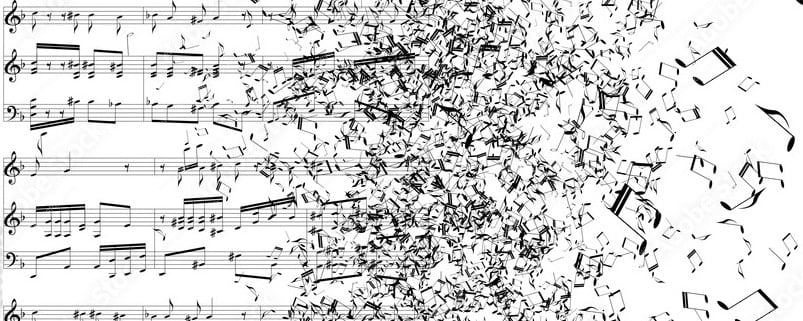Learning music backwards? part #1
- Author Profile
- Recent posts
Interested in jazz, classical music on original instruments, radical improvisation. Diploma from the Cagliari Conservatory. He has been active on the jazz scene since around 1980. He has played in symphony, opera and chamber music orchestras since 1985. He has been teaching double bass since 2001, and classical double bass, jazz and ensemble music at the Cagliari Conservatory since 2004.
It doesn't matter if we went to music school or the conservatory, or no school at all, or if we studied for years as self-taught, but when it comes down to it, there's always a problem: our solos are mediocre, or they suck, or we can't come up with anything...
It is not that ARE WE TRYING TO LEARN MUSIC AND IMPROVISATION IN REVERSE?
We read theory books, thewe learn scales, study triads and arpeggios in each key, memorise chord progressions and learn new songs, and then we try to improvise but nothing interesting happens...
Sounds familiar? this is the standard approach to jazz improvisation that we find in schools, private lessons, masterclasses, and study rooms everywhere. It is what we have come to accept as 'THE WAY' to learn improvisation.
The truth is that this learning process that is prescribed to us can easily seem like a good exercisemixing and matching notes on chord progressions. Of course the songs change, the style of music changes with time, but in the end we will always be faced with the same challenge: cercing to put together related notes, scales, chord tones, rhythms, to somehow create an interesting musical idea.
It is frustrating and futile to try to come up with an idea out of thin air using only music theory. And that's why you hear many students say "I always do the same thing, I keep using the same scales, how can I come up with melodies and connect chords?"
This problem is much more common than we imagine.
It comes from the fact that we have been taught (or have taught ourselves) the approach to improvisation on the contrary! That is, we were told to start with all the elements present in a musical discourse, without ever learning how to put them together - basically trying to make fantastic reverse-engineered solos from a handful of music theory rules.
This one-sided approach to learning improvisation technique causes a lot of confusion and discourages anyone. Even studying theory and memorisation technique at length does not actually help us improve.
However, we do not have to start all over again every time we play a solo or resign ourselves to putting scales and chords together. The model for creating great melodic lines and acquiring melodic skills is contained in the music we listen to every day.
The trick is to start from the information contained in the music we listen to, instead of trying to get there by chance from the rules.
ONE SHOULD NOT PUT MUSIC THEORY BEFORE MUSIC
As mentioned earlier, the typical approach common to many types of learning jazz and improvisation in general revolves around individual elements of music theory.
From our first lesson we dive into a world of rules and definitions, believing that this is how our musical ideas will come out. The expectation is that with enough repetition, with enough hours of study, all the pieces of the puzzle will fall into place.
When it is time to improvise, we will put all our trust in luck, hoping for a moment of inspiration that will turn all this information into a musical phrase.
But done in this sequence, we have no idea what we are trying to do, which is how to use this theoretical information in a musical way, we have no idea of the characteristics of a melody, or the specific skills to create one. It's a bunch of information that by itself is useless, without the instructions to use it, and something that doesn't work, whatever we're trying to learn.
Imagine giving someone the ingredients for a three-course meal, without giving him the recipe and the cooking techniques to prepare it. Imagine throwing the ingredients on the table and telling them, "Good, now to work!".
You would not do this expecting good results, any more than you would give an aspiring writer a list of grammar rules expecting him to come up with a successful novel or a magnificent book of poetry.
Likewise, you would not expect a musician from a couple of scales and chord progressions at some point to start improvising like Charlie Parker. Under no circumstances, even with hours and hours of study and memorisation can this approach yield good results.
Remember, the fact that we have the information does not necessarily mean that we know how to use it, or that we have the necessary skills to start improvising. A scale is just a sequence of notes, it does not have instructions. If we learn the Cyrillic alphabet by heart, it doesn't mean that we can do a nuclear physics lecture in Russian immediately afterwards!
It is very difficult for many musicians to come to terms with this, but simply understanding theory and studying scales does not mean that one can at some point improvise melodic lines. You have to realise that understanding the sound of a major chord does not mean you can play melodic lines over it, and that doing arpeggios over a chord progression does not translate into the ability to improvise melodic lines, and that showing up to play a piece having memorised the theme and chords is no guarantee for a good solo.
The sooner we realise that theory is just a piece of the puzzle to be put into the bigger picture of 'why we play' the sooner we will notice improvements in our improvisation.
PUTTING MUSIC FIRST
It is a fact that every musician needs to understand theory and have a certain instrumental technique, but improvising requires much more than that, it requires creating melody in the moment, putting all our theory and technique together to tell a story. Even if we manage to create some good indea then, it would be useless musically, if we don't tell our story, with our sound, our melodies.
THEORY DOES NOT GIVE US INSTRUCTIONS FOR CREATING MUSIC, IT CAN ONLY EXPLAIN WHY AND HOW SOME THINGS WORK AND OTHERS DO NOT.
Continued...






Leave a Reply
Want to join the discussion?Feel free to contribute!